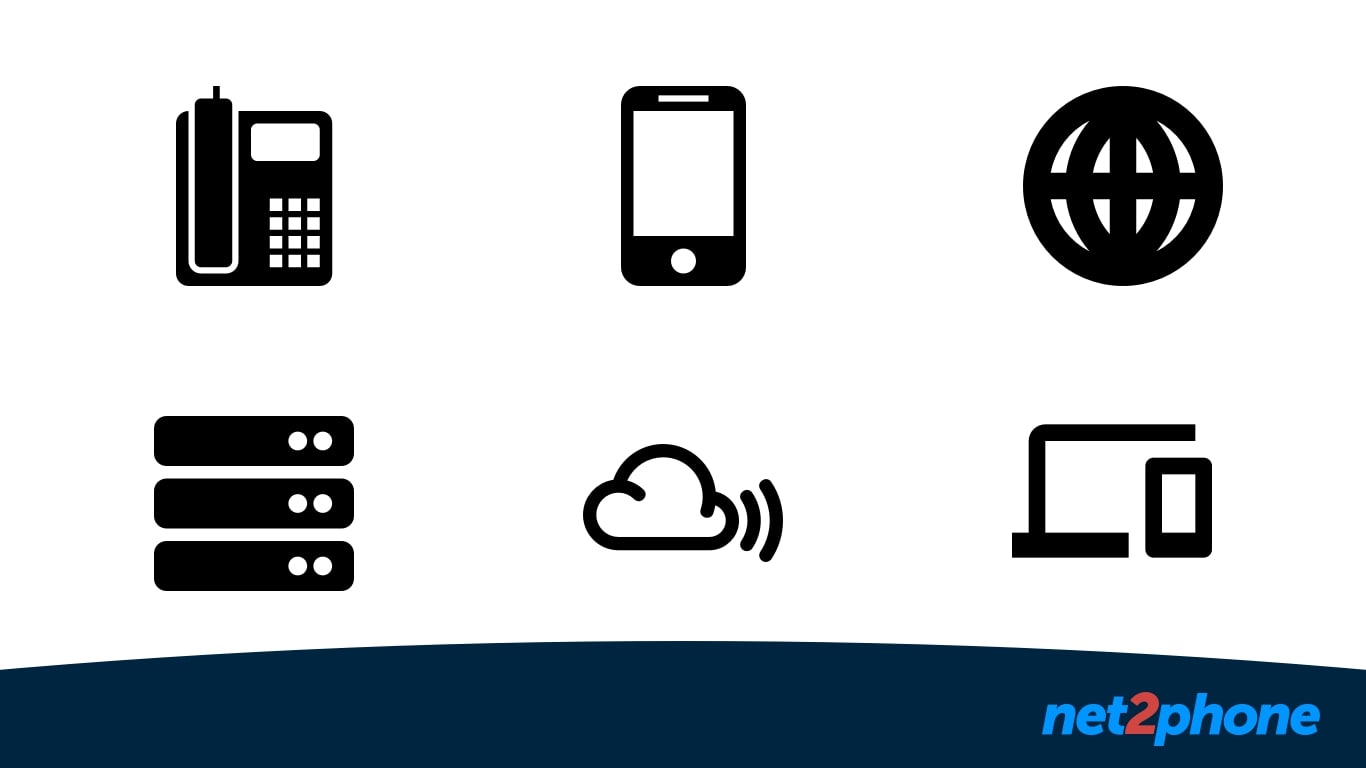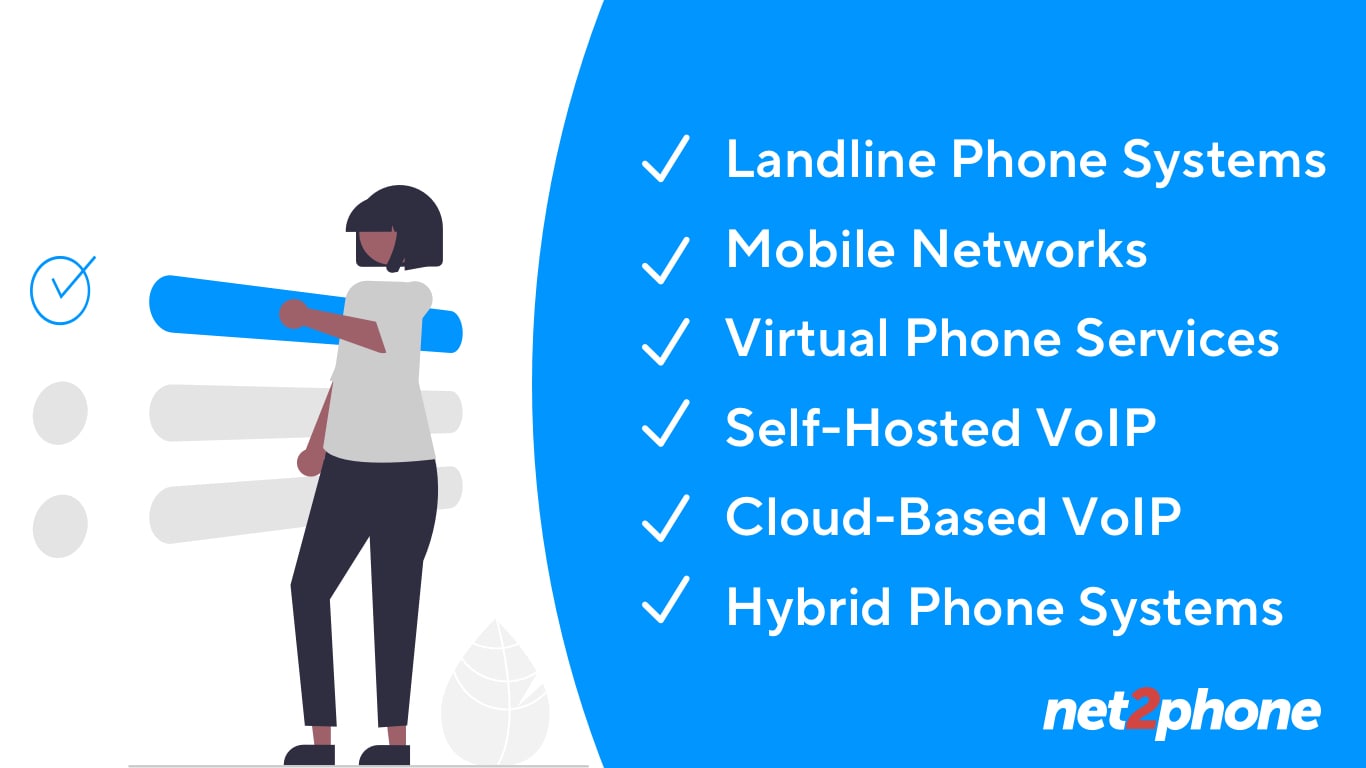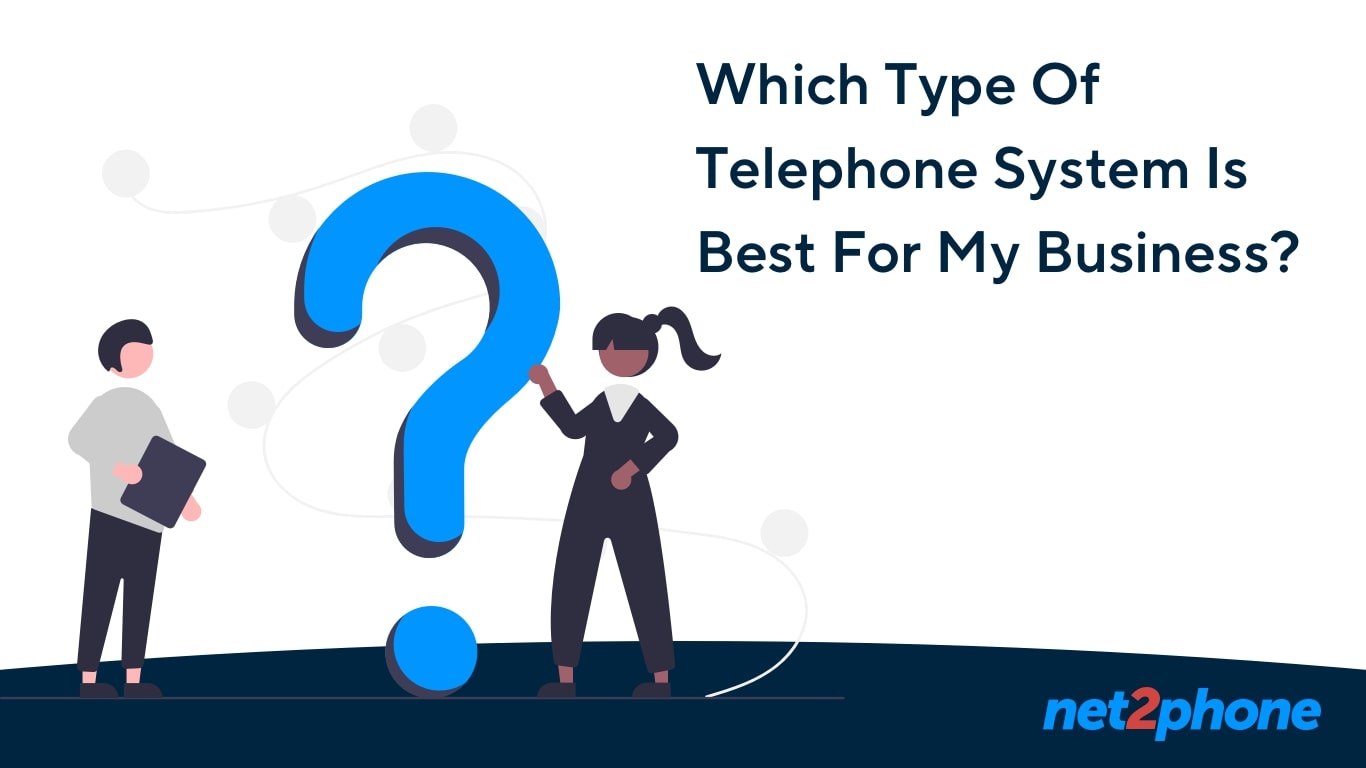
You may have the smartest gadgets and the coolest software money can buy – but if your business phone system isn’t up to scratch, you could find yourself struggling to keep pace with your competitors. In this guide we overview the different types of phone systems for small businesses & enterprises and some of the criteria you should consider when choosing a telephone service to enhance your business.
Types Of Phone Systems For Business
 We’ll begin by looking at the main types of phone systems available for business users:
We’ll begin by looking at the main types of phone systems available for business users:
- landline phone systems
- mobile networks
- virtual phone services
- self-hosted VoIP
- cloud-based VoIP
- hybrid phone systems
Landline Systems
Tried, tested, and with years of backing from service providers and equipment manufacturers, a landline phone system may be an option if you’re in the early stages of enterprise development, own or currently rent your on-site hardware, and are hesitant about new technologies and their possible complications.
But while this type of phone system traditionally offers quality and reliability of service, they may prove problematic if you or your employees spend a lot of time away from the office. And with the increasing need for modern business communications to incorporate aspects of other elements such as the sharing of documents, images, or large data files, the limitations of this technology may soon become apparent.
Mobile Networks
As you step away from traditional cable-based phone systems, smartphones and other mobile devices will figure largely in any option that you consider. At the scale of the smallest enterprises (where the number of people making up an organization may be very few), it’s possible to get by with a telecoms system based entirely on individually owned mobile phones.
Related: What is a VoIP Phone and How Do IP Phones Work?
Typically, this will involve paying for a subscription to a cellular service provider – with its attendant charges for international and long-distance calling, data plans, international roaming, and so forth. Tariffs and service levels are only as good as the network provider you choose.
Virtual Phone Services
An especially popular type of phone system amongst small and micro-sized enterprises, virtual phone services give the option for existing landlines to be diverted to your designated mobile phone numbers. This extends business phone availability to remote and mobile workers, who can be connected to a designated office site whose number is registered with the system. Some providers also offer virtual receptionist services.
Self-hosted VoIP
What is VoIP? Voice over Internet Protocol or VoIP is a telecommunications technology based on digital data transfer which allows for an easier integration of both desk-based and mobile telephone equipment. IP telephony (a general term for phone systems using the internet as a transmission medium) makes use of both the internet and your organization’s Local Area Network (LAN), in conjunction with a virtual Private Branch Exchange (PBX).
Related: What is VoIP?
This type of business phone systems is largely software-based, so there’s little outlay required for on-premises hardware. Service plans vary, but it’s now a generally accepted fact that VoIP phone systems for business are considerably more cost-effective than landlines. Calls to phone numbers within the same network are usually free, while long-distance and international calls may be charged at local rates as they’re carried over internet channels.
The self-hosted VoIP phone system option is dependent on your having an IP-PBX installed at your own business premises. This is an option if your organization has a capable IT department to handle the installation, maintenance, and upgrading of the equipment.
“Perpetual payment” models exist for self-hosted VoIP business phone systems, whereby you can make an upfront payment then use the system “in perpetuity”, incurring minimal monthly overhead payments from that point on.
Related: VoIP Migration Plan
Cloud-based VoIP (Hosted VoIP or IP-PBX)
For those wishing to enjoy the cost and operational benefits of VoIP but lacking the staff or technical expertise to manage an on-premises solution, a VoIP system hosted and managed by a service provider in the cloud is the next best bet.
Besides the reduction in hardware, installation, and maintenance requirements with your infrastructure resident in the cloud, there’s a corresponding relief from the burden of housing equipment on your premises – ideal in these times of escalating office rents. If your organization exists across several branch sites or remote offices, this type of phone system can be configured to assign phone numbers based on any location that you designate.
This coverage extends to mobile devices, so remote and mobile workers can be connected to your business phone system regardless of their location. Systems can be scaled up or down easily, with a subscription payment model typically based on monthly charges.
Related: Hosted PBX Vs Onsite PBX. The Key Differences
Hybrid Systems
Larger enterprises and those wishing to extend the life of their existing hardware may opt for a combined system, connecting their Public Switched Telephone Network (PSTN) to their business IP-PBX system. At the desktop level, there’s a range of hardware including hybrid phones which may be used as a standard landline or as a VoIP installation.
Which Type Of Telephone System Is Best For My Business?
it is impossible to answer this question unambiguously. It all depends on your needs, the size of your company, the presence of international offices, financial capabilities, the availability of departments and equipment.

However, do not despair! Contact us today and one of our phone system experts tell what phone system you have now, and what you require in the future and they’ll recommend you the best type of phone system for your business's needs. Also, you can check the main differences of cloud vs on-premise phone systems in our blog.
Related: Cloud vs On-Premise Phone System
In the meantime, here are some considerations to bear in mind:
- Is your network bandwidth (internet connection speed) fast and reliable enough to assure smooth data transmission and voice quality for VoIP?
- What kinds of features and telecommunications network access will you and your remote or mobile workers require?
- What volume of calls do you anticipate – and will this change over time?
- How many lines do you expect that you’ll need?
- What kind of hardware do you already possess?
- What equipment and software will you need to put a new system in place?
Related: VoIP vs Analog Phone System. What’s Best for My Business?


 We’ll begin by looking at the main types of phone systems available for business users:
We’ll begin by looking at the main types of phone systems available for business users: